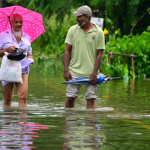Lina Eichler, a 21-year-old German activist, has transitioned from disruptive street protests to political campaigning as part of her environmental group, Letzte Generation (Last Generation), ahead of the upcoming EU elections.
While the group has gained attention for their controversial tactics, such as obstructing traffic and unconventional protests like throwing mashed potatoes at paintings, they are now seeking to engage in mainstream politics to address the climate crisis.
Eichler and her group are focused on raising awareness about the urgent need to combat climate change, feeling that the issue has been sidelined in political discourse.
They criticize Germany’s Green party, which is part of Chancellor Olaf Scholz’s coalition government, for not delivering substantial environmental reforms.
Despite their divisive methods and legal challenges, Letzte Generation sees the EU elections as an opportunity to challenge the status quo and push for meaningful action on climate change.
Through their campaign, they aim to reignite public discussion about the impending climate catastrophe and hold political leaders accountable for their actions—or lack thereof.
the rhinoceros in the chamber
Environmental parties like the Greens have faced criticism and declining popularity in Europe since the last EU elections in 2019. In Germany, for example, the Greens saw a significant drop in support from 20.5 percent in the EU elections to just 12 percent in April 2024, the lowest level since 2018.
Climate activists have attributed this decline to perceived compromises made by the Greens, such as the temporary reopening of coal-fired power stations and increased reliance on liquefied natural gas imports.
Marie Krpata, an expert on German politics, highlighted that the Greens have faced criticism from both the right and left of the political spectrum for their policies. Critics argue that the party’s measures threaten the economy while also accusing them of abandoning their climate objectives.
Against this backdrop, Letzte Generation aims to refocus attention on the climate crisis and place it at the center of political discourse. Carla Hinrichs, a co-founder of Letzte Generation and an election candidate, emphasized the group’s commitment to addressing the climate emergency and criticized the Greens for compromising their values.
However, there are concerns that Letzte Generation’s participation in the elections could split the environmentalist vote and undermine the chances of parties like the Greens.
Hinrichs, however, dismissed these concerns, asserting that it is not their responsibility if the Greens are unable to maintain their support base due to perceived compromises.
‘Shake up parliament’
Fridays for Future, the environmental movement inspired by Greta Thunberg, is also leveraging the upcoming EU elections to raise awareness about the climate crisis.
The movement has called for protests across Germany and launched a campaign called “RecoverTikTok” to challenge the influence of the far right on social media platforms.
Luisa Neubauer, the German leader of Fridays for Future, emphasized the importance of defending previous achievements in combating climate change and pushing for further progress.
Protesters like Jonathan Roessler expressed dissatisfaction with the mainstream Green party, citing their perceived lack of radicalism in addressing environmental issues.
In contrast, Letzte Generation is organizing rallies and advocating for direct action to combat climate change. Their strategy includes blockading streets, bridges, and squares, as well as promising “one action” per month in the European Parliament if any of their candidates are elected. Despite their electoral aspirations, Letzte Generation does not plan to seek specific legislation or join political coalitions.
Their goal is to shake up the parliament and bring attention to their protests.
While there is no polling data indicating their potential electoral success, Letzte Generation aims to attract at least 200,000 votes and secure at least one seat in the European Parliament.
Their approach reflects a desire to bring climate activism directly into the political arena while maintaining a stance outside traditional political structures.



